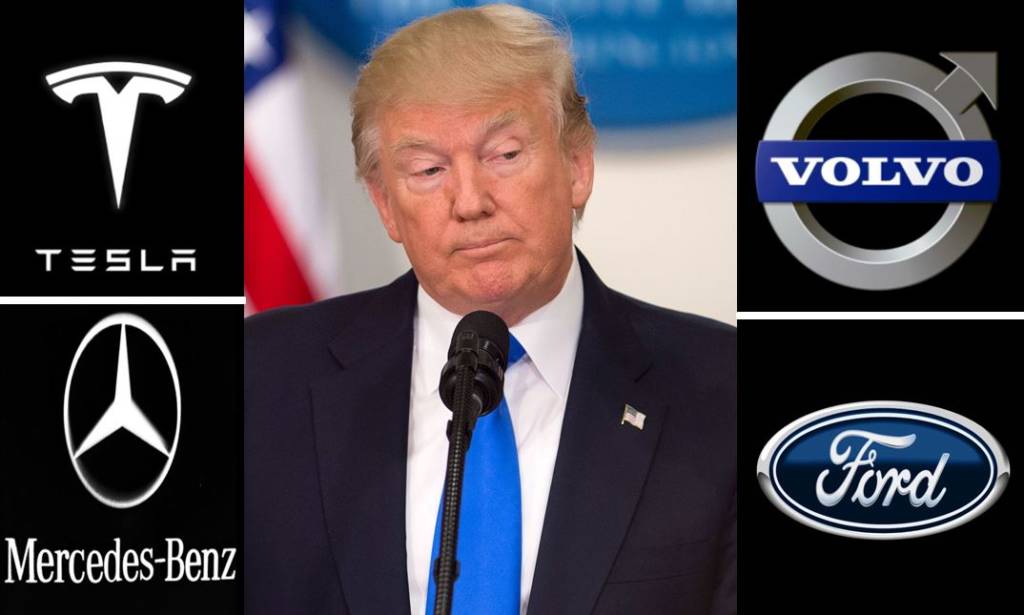Corporate giants in the United States are rallying behind China as the Trump administration takes the Chinese Communist Party by its devilish horns for all its misadventures. A trade war between the two countries has been news for quite some time, however, with the COVID-19 pandemic, and China single-handedly destroying the global economy, Donald Trump has taken it upon himself to teach the CCP a lesson. Yet, Trump’s fight against China is increasingly being compromised by vested interest groups, in the form of corporate giants from US and other countries, who happen to have tremendous interests and investments in the Communist state.
Major automakers Tesla, Volvo, Ford and Mercedes-Benz have sued the US government over tariffs on Chinese goods, demanding customs duties paid on imports be returned, with interest no less, AFP reported. The lawsuits which have been filed by the auto majors come in the backdrop of the Office of the US Trade Representative (USTR) imposing tariffs on imports from China.
While Tesla called the imposition “arbitrary, capricious, and an abuse of discretion” Mercedes Benz took to accusing Washington of “prosecution of an unprecedented, unbounded, and unlimited trade war impacting over $500 billion in imports from the People’s Republic of China.”
China is the world’s largest automobile market, which is why many automakers are hurt at the prospect of US imposing high tariffs on imports from the red-rogue state. TFI had earlier also reported that the US was on the cusp of imposing a blanket ban on imports of cotton and related products, and tomatoes from China-occupied Xinjiang province, where many suspect the CCP uses ethnic minorities as forced labour.
Meanwhile, Stephen Lamar, president of the American Apparel and Footwear Association told lawmakers on Thursday that blanket U.S. import bans on cotton or other products from China’s Xinjiang region over forced labour concerns would “wreak havoc” on legitimate supply chains. Further, he also added that a blanket ban on import of cotton from Xinjiang would be “impossible to enforce”.
As reported by TFI earlier also, there seems to be a concerted effort being mounted by corporate giants in the US to derail the superpower’s decoupling from China, which is aimed at dethroning the CCP-ruled country from its current position of a global supply chain hegemon. Not only is the US, under President Trump becoming increasingly hostile towards the prospect of fuelling China’s economy, but it is also shoring support for the same from the global community.
Wall Street giants such as Goldman Sachs Group Inc. and JP Morgan Chase & Co. have tens of billions of dollars at stake in China as political tension risks derailing the nation’s opening of its $45 trillion financial markets. Five big US banks had a combined $70.8 billion of exposure to China in 2019, with JP Morgan alone ploughing $19.2 billion into lending, trading and investing. That’s a 10% increase from 2018. Such is the thirst of Wall Street to make inroads in China that companies like Goldman Sachs are hiring sons, daughters, nephews and nieces of CCP’s Politburo in its plush US offices without any experience and qualification to show its goodwill. In 2016 JP Morgan Chase was fined by American regulators for giving jobs to well-connected Chinese “princelings”.
China is not just an economic offender which must be tamed, rather, it is no less than a national security risk for the United States too. Intellectual property theft, copying of defence infrastructure, espionage, financial frauds, et al are only a few of the many crimes which China commits globally. As such, what the US corporates should be doing, is siding with the Trump administration instead of crying foul over it punishing the Chinese Communist regime.
Donald Trump is perhaps the most favourable President which US corporates have got after a long time. Instead of lending their support to Trump’s cause of decoupling from China, when such market giants pursue their own vested interests alone while ignoring the larger public good, one is compelled to ask – do they deserve any sympathy from the public? Companies from other democratic countries too, which are attempting to derail Trump’s struggle against China must be named and shamed publicly.
